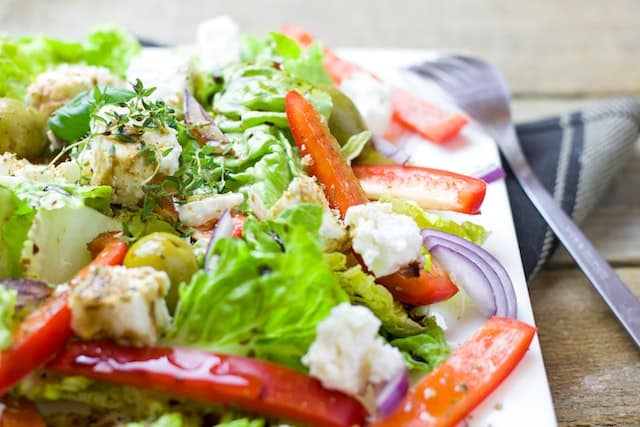Chicken salad is a popular dish made with cooked chicken, mayonnaise, and various vegetables. It’s a quick and easy meal that can be enjoyed as a sandwich, wrap, or even on its own.
However, for pregnant women, it’s important to be cautious about the foods they consume to ensure the health and safety of both themselves and their unborn child. This raises the question: can pregnant women eat chicken salad?
Understanding Chicken Salad Chicken salad is typically made with cooked chicken, which is a good source of protein. However, it’s important to note that the safety of chicken salad depends on how it’s prepared and stored.
Mayonnaise, a common ingredient in chicken salad, can be a breeding ground for bacteria if left at room temperature for too long. Additionally, raw vegetables used in the salad can also be a source of contamination if not properly washed and prepared.
Pregnancy and Food Safety Pregnancy can weaken a woman’s immune system, making her more susceptible to foodborne illnesses. This is why it’s important for pregnant women to be mindful of the foods they consume and how they’re prepared.
Certain bacteria, such as Listeria and Salmonella, can be harmful to both the mother and the baby and can lead to serious health complications.
As a result, pregnant women are advised to avoid certain foods that are more likely to be contaminated, including some types of deli meats, soft cheeses, and raw seafood.
Key Takeaways
- Pregnant women should be cautious when consuming chicken salad due to the risk of bacterial contamination.
- Proper preparation and storage of chicken salad is crucial to ensure its safety.
- Pregnant women should be mindful of the foods they consume to avoid the risk of foodborne illnesses.
Understanding Chicken Salad
Chicken salad is a popular dish that can be enjoyed by many people. However, pregnant women may have concerns about whether they can eat it safely.
This section will provide information about chicken salad, its ingredients, and whether it is safe to eat while pregnant.
Ingredients
Chicken salad typically consists of cooked chicken, mayonnaise or salad dressing, and various other ingredients such as celery, onion, and herbs. The ingredients used in chicken salad can vary depending on whether it is homemade, store-bought, or pre-packaged.
Mayonnaise is a common ingredient in chicken salad, and pregnant women may be concerned about its safety. Commercially prepared mayonnaise is made with pasteurized eggs, which are safe for pregnant women to eat.
However, homemade mayonnaise made with raw eggs can pose a risk of salmonella infection and should be avoided.
Homemade vs. Store-bought
Homemade chicken salad can be a healthy and delicious option, as it allows you to control the ingredients used. However, it is important to ensure that all ingredients are fresh and properly stored to prevent foodborne illness.
Store-bought chicken salad can be a convenient option, but it is important to read the label and check the ingredients. Some store-bought chicken salads may contain preservatives or high amounts of sodium, which may not be ideal for pregnant women.
Pre-packaged Chicken Salad
Pre-packaged chicken salad, such as those sold at Costco, may contain added preservatives and other ingredients that may not be ideal for pregnant women.
It is important to read the label and check the ingredients before consuming pre-packaged chicken salad.
In conclusion, chicken salad can be a safe and healthy option for pregnant women, as long as it is made with fresh ingredients and pasteurized mayonnaise. It is important to read the label and check the ingredients when consuming store-bought or pre-packaged chicken salad.
Pregnancy and Food Safety
Pregnant women need to be extra cautious about their food choices to ensure the health of their developing baby.
Foodborne illnesses can be particularly dangerous during pregnancy, as they can lead to serious complications such as miscarriage, stillbirth, and preterm labor.
The Food and Drug Administration (FDA) has issued guidelines for pregnant women to follow in order to reduce the risk of foodborne illnesses.
These guidelines include:
- Avoiding certain types of fish that are high in mercury, such as shark, swordfish, and king mackerel.
- Cooking meat, poultry, and seafood to the correct temperature to kill any harmful bacteria.
- Washing fruits and vegetables thoroughly before eating them.
- Avoiding unpasteurized dairy products, such as raw milk and cheese made from raw milk.
- Avoiding deli meats and hot dogs unless they are heated until steaming hot.
It is important for pregnant women to discuss their diet and food safety concerns with their healthcare provider. They can provide personalized recommendations based on the individual’s medical history and pregnancy.
In addition to following the FDA guidelines, pregnant women should also practice good food safety habits at home. This includes washing hands and surfaces frequently, separating raw meat from other foods, and refrigerating perishable foods promptly.
By following these guidelines and practicing good food safety habits, pregnant women can reduce the risk of foodborne illnesses and ensure the health of their developing baby.
Risks of Listeria and Salmonella
Pregnant women should be cautious about consuming chicken salad due to the risk of Listeria and Salmonella.
These two bacteria can cause serious foodborne illnesses, which can be particularly dangerous for pregnant women and their unborn babies.
Listeria is a type of bacteria that can cause listeriosis, a serious infection that can lead to miscarriage, stillbirth, premature delivery, or life-threatening infection in newborns.
The bacteria can be found in a variety of foods, including deli meats, soft cheeses, and ready-to-eat salads like chicken salad. Pregnant women are about 10 times more likely than the general population to get listeriosis.
Salmonella is another type of bacteria that can cause salmonellosis, a common foodborne illness that can cause symptoms like diarrhea, fever, and abdominal cramps.
While most people recover without treatment, pregnant women are at higher risk of developing complications like dehydration, premature labor, and infection in the bloodstream.
Chicken salad can be contaminated with Listeria and Salmonella if it is not prepared, stored, or handled properly. The bacteria can also be spread from other contaminated foods, surfaces, or utensils.
It is important for pregnant women to take precautions when consuming chicken salad, including:
- Avoiding pre-packaged or deli chicken salad, which may have a higher risk of contamination
- Making sure chicken salad is stored at the proper temperature (below 40°F) and consumed within a few days of preparation
- Checking that chicken salad is thoroughly cooked before consuming
- Washing hands and surfaces thoroughly before and after handling chicken salad
Pregnant women should also be aware of other types of foodborne illnesses that can be caused by bacteria like E. coli and outbreaks that may affect the safety of chicken salad.
It is important to stay informed about food recalls and take necessary precautions to protect both the mother and baby’s health.
Chicken and Pregnancy
When it comes to pregnancy, it is important to be mindful of what you eat. Chicken is a popular source of protein and is safe to consume during pregnancy, as long as it is cooked properly.
Consuming undercooked chicken or any other poultry can increase the risk of foodborne illnesses, such as salmonella. It is recommended that pregnant women avoid consuming undercooked meat, including chicken, to prevent any potential harm to the developing fetus.
Canned chicken is another option for pregnant women, but it is important to check the label for any added preservatives or sodium. It is also recommended to opt for low-sodium options when possible.
Deli meat, including chicken salad, may contain listeria, a type of bacteria that can cause serious harm to the developing fetus.
It is recommended that pregnant women avoid consuming deli meat, including chicken salad, unless it has been heated to an internal temperature of 165°F.
If you are craving chicken salad during pregnancy, it is safe to consume as long as it is prepared properly. Cold chicken salad should be stored at a safe temperature and consumed within a few days to prevent any potential harm.
It is also recommended to make your own chicken salad at home to ensure proper food safety practices are followed.
In summary, chicken is a safe and healthy source of protein during pregnancy when cooked properly. Pregnant women should avoid consuming undercooked chicken, canned chicken with added preservatives or sodium, and deli meat unless it has been heated to the appropriate temperature.
Cold chicken salad is safe to consume as long as it is stored properly and consumed within a few days.
Eggs and Pregnancy
Eggs are a great source of protein and are a staple in many diets. However, when it comes to pregnancy, there are some things to keep in mind.
Raw or undercooked eggs should be avoided during pregnancy as they may contain harmful bacteria such as Salmonella. It is important to always cook eggs thoroughly until the yolk and white are firm.
Pasteurized eggs are a safer option for pregnant women. These eggs have been heated to a temperature that kills any harmful bacteria, making them safe to consume.
It is recommended to use pasteurized eggs in recipes that call for raw or undercooked eggs, such as Caesar salad dressing or homemade mayonnaise.
It is important to note that not all eggs are pasteurized. Always check the label before purchasing eggs to ensure they have been pasteurized. Unpasteurized eggs should be avoided during pregnancy as they may contain harmful bacteria.
Overall, eggs can be a healthy and nutritious addition to a pregnant woman’s diet when cooked properly and consumed in moderation. It is important to always follow safe food handling practices to minimize the risk of foodborne illness.
Vegetables in Chicken Salad
Chicken salad is a popular dish that can be enjoyed by pregnant women. It is a good source of protein and can be made healthier by adding vegetables.
However, pregnant women need to be careful about the vegetables they consume in chicken salad.
Raw vegetables should be avoided as they can contain harmful bacteria such as E. coli and Salmonella. Pregnant women should ensure that all vegetables in the chicken salad are thoroughly washed and cooked.
Raw sprouts such as alfalfa, clover, radish, and mung bean should also be avoided as they can carry harmful bacteria.
Fruits and vegetables are important sources of vitamins and minerals for pregnant women. Adding produce such as lettuce, spinach, and kale to chicken salad can provide additional nutrients.
Pregnant women should also ensure that they are consuming a variety of fruits and vegetables to ensure they are getting all the necessary nutrients.
In summary, pregnant women can enjoy chicken salad with vegetables as long as they ensure that all vegetables are thoroughly washed and cooked. Raw sprouts should be avoided.
Adding a variety of fruits and vegetables to chicken salad can provide additional nutrients for pregnant women.
Seafood and Pregnancy
Seafood is a great source of protein and omega-3 fatty acids, which are important for fetal development. However, pregnant women need to be cautious about the types of seafood they consume.
Raw seafood, such as sushi, sashimi, and ceviche, should be avoided during pregnancy. These dishes can contain harmful bacteria and parasites that can cause food poisoning and other health problems.
Smoked seafood, such as kippered and anchovies, should also be avoided during pregnancy. These products can contain high levels of sodium and other preservatives that can be harmful to the developing fetus.
Certain types of fish should be avoided during pregnancy due to their high levels of mercury. These include king mackerel, marlin, orange roughy, swordfish, shark, and tilefish.
Pregnant women should limit their consumption of other types of fish, such as cod and trout, to no more than two servings per week.
On the other hand, seafood that is low in mercury and high in omega-3 fatty acids, such as salmon and shrimp, can be consumed in moderation during pregnancy. Pregnant women should aim to consume at least 8-12 ounces of seafood per week.
In summary, pregnant women should be cautious about the types of seafood they consume. Raw and smoked seafood should be avoided, as well as certain types of fish that are high in mercury.
However, seafood that is low in mercury and high in omega-3 fatty acids can be consumed in moderation.
Cheese and Pregnancy
Cheese is a popular food item that is enjoyed by many people around the world. However, when it comes to pregnancy, there are some important things to consider before consuming cheese.
Soft cheeses, such as Brie, Camembert, and blue-veined cheeses, should be avoided during pregnancy. These types of cheeses are more likely to contain listeria, a harmful bacteria that can cause serious illness in pregnant women. Listeria can also cause miscarriage or stillbirth.
Hard cheeses, such as cheddar, gouda, and parmesan, are generally safe to eat during pregnancy. These types of cheeses are made with pasteurized milk, which helps to kill any harmful bacteria.
When it comes to unpasteurized dairy products, such as raw milk and cheese, it is important to avoid them during pregnancy. These products can contain harmful bacteria, including listeria, salmonella, and E. coli, which can cause serious illness in pregnant women.
It is important for pregnant women to choose their cheese carefully and to always check the label for pasteurization. If in doubt, it is best to avoid soft cheeses and unpasteurized dairy products altogether during pregnancy.
Pregnancy and Immune System
During pregnancy, a woman’s immune system undergoes changes to ensure the healthy development of the fetus. These changes can make pregnant women more susceptible to infections and illnesses.
However, the immune system also plays a crucial role in protecting the developing fetus from harmful pathogens.
The immune system is responsible for recognizing and attacking foreign substances, such as bacteria and viruses, that can cause infections.
During pregnancy, the immune system is suppressed to prevent it from attacking the developing fetus, which contains foreign genetic material from the father.
This suppression of the immune system can make pregnant women more vulnerable to infections such as the flu, which can be dangerous for both the mother and the developing fetus.
Therefore, it is important for pregnant women to take extra precautions to avoid exposure to infections and to maintain good hygiene practices.
While chicken salad is generally safe to eat during pregnancy, it is important to ensure that it is prepared and stored properly to avoid the risk of foodborne illnesses.
Pregnant women should avoid consuming raw or undercooked chicken, as it can be contaminated with harmful bacteria such as Salmonella.
In summary, pregnant women’s immune systems undergo changes to protect the developing fetus, which can make them more susceptible to infections. It is important for pregnant women to take extra precautions to avoid exposure to infections and to maintain good hygiene practices.
Chicken salad is generally safe to eat during pregnancy, but precautions should be taken to ensure that it is prepared and stored properly to avoid the risk of foodborne illnesses.
Possible Consequences of Foodborne Illnesses
Consuming contaminated food during pregnancy can cause serious health issues for both the mother and the baby. Foodborne illnesses can be caused by viruses, bacteria, parasites, and other pathogens that can be found in undercooked or raw meat, poultry, fish, and eggs.
Miscarriage and stillbirth are possible consequences of foodborne illnesses during pregnancy. Certain types of bacteria, such as Listeria monocytogenes, can cause miscarriage, stillbirth, premature delivery, or life-threatening infections in newborns.
Parasites such as Toxoplasma gondii can cause severe health issues in pregnant women and their fetuses. Pregnant women who contract Toxoplasmosis are at risk of having a miscarriage or stillbirth.
The parasite can also cause serious health issues in newborns, including blindness, intellectual disabilities, and seizures.
Viruses such as the hepatitis A virus and the norovirus can also cause foodborne illnesses. Pregnant women infected with these viruses can experience severe symptoms, including vomiting, diarrhea, and dehydration.
These symptoms can lead to premature delivery or low birth weight in newborns.
It is essential to take necessary precautions to avoid foodborne illnesses during pregnancy. Pregnant women should avoid consuming undercooked or raw meat, poultry, fish, and eggs.
They should also avoid unpasteurized dairy products and juices. It is recommended to wash all fruits and vegetables thoroughly before consuming them.
In conclusion, foodborne illnesses can have severe consequences for pregnant women and their fetuses. It is essential to take necessary precautions and follow food safety guidelines to avoid contracting foodborne illnesses during pregnancy.
Other Foods to Be Cautious Of
Aside from chicken salad, there are other foods that pregnant women should be cautious of. These foods may pose a risk of foodborne illness or other health concerns that could harm both the mother and the developing fetus.
Luncheon meats and meat spreads, for example, may contain Listeria monocytogenes, a type of bacteria that can cause listeriosis. This infection can lead to miscarriage, stillbirth, premature delivery, or severe illness or death of the newborn.
Pregnant women should heat these foods until they are steaming hot before consuming them to kill any potential bacteria.
Hot dogs are another food item that may contain Listeria monocytogenes. Pregnant women should also heat hot dogs until they are steaming hot before eating them.
Raw or undercooked meat, poultry, and seafood may contain harmful bacteria or parasites that could cause foodborne illness. Pregnant women should avoid consuming these foods, unless they have been cooked to a safe temperature.
Fruits and vegetables should be thoroughly washed before consumption to remove any potential bacteria or pesticides. Pregnant women should also avoid consuming unpasteurized juices, as they may contain harmful bacteria.
While salads can be a healthy choice during pregnancy, it is important to ensure that they are prepared and stored properly. Caesar salad dressing may contain raw eggs, which can pose a risk of Salmonella infection.
Pregnant women should also avoid consuming salads from restaurants or salad bars, as they may have been sitting out at room temperature for too long.
Overall, pregnant women should be cautious of their food choices and take necessary precautions to ensure the safety of themselves and their unborn child.
Conclusion
In conclusion, chicken salad can be a healthy and tasty addition to a pregnant woman’s diet, as long as certain precautions are taken. It is important to ensure that the chicken is cooked thoroughly to avoid the risk of foodborne illness, and to avoid consuming raw or undercooked eggs in the dressing.
Additionally, pregnant women should be mindful of the ingredients in the salad, such as mayonnaise, which may contain raw eggs. Opting for a homemade dressing made with pasteurized eggs or a vinaigrette dressing can be a safer choice.
Overall, incorporating chicken salad into a balanced diet can provide a good source of protein and other important nutrients for both the mother and the developing fetus. As always, pregnant women should consult with their healthcare provider to determine the best dietary choices for their individual needs.
Learn more from similar posts:
Frequently Asked Questions
Is it safe to eat chicken salad during pregnancy?
Yes, it is safe to eat chicken salad during pregnancy as long as it is prepared and stored properly. Pregnant women should ensure that the chicken is cooked thoroughly and the salad is made fresh.
It is also important to avoid consuming chicken salad that has been left at room temperature for more than 2 hours.
Can I eat chicken salad sandwiches while pregnant?
Yes, you can eat chicken salad sandwiches while pregnant as long as the chicken is cooked thoroughly and the sandwich is made fresh. It is important to avoid consuming sandwiches that have been left at room temperature for more than 2 hours.
Is homemade chicken salad safe to eat during pregnancy?
Yes, homemade chicken salad is safe to eat during pregnancy as long as the chicken is cooked thoroughly and the salad is made fresh. Pregnant women should avoid consuming homemade chicken salad that has been left at room temperature for more than 2 hours.
Can pregnant women eat chicken salad from Panera?
Yes, pregnant women can eat chicken salad from Panera as long as the chicken is cooked thoroughly and the salad is made fresh. It is important to avoid consuming chicken salad that has been left at room temperature for more than 2 hours.
Can I eat cold chicken while pregnant?
Pregnant women should avoid consuming cold chicken as it may contain harmful bacteria. It is recommended to consume chicken that has been cooked to an internal temperature of 165°F.
Is it safe to eat chicken mayo during pregnancy?
Pregnant women should avoid consuming chicken mayo as it may contain harmful bacteria. It is recommended to consume chicken that has been cooked to an internal temperature of 165°F and to avoid consuming mayonnaise that has been left at room temperature for more than 2 hours.

Iesha is a loving mother of 2 beautiful children. She’s an active parent who enjoys indoor and outdoor adventures with her family. Her mission is to share practical and realistic parenting advice to help the parenting community becoming stronger.




